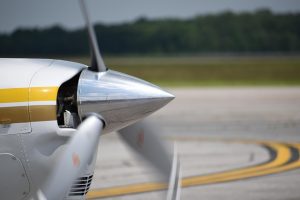
Ever wonder why turboprops need oil? As gas turbine engines, turboprops don’t have cylinders. Cylinders are exclusive to reciprocating or piston engines. Even without cylinders, though, turboprops still require oil to function as intended.
Lubrication
One of the main functions of oil in turboprops is lubrication. Turboprops have many moving parts. In addition to the propeller, they have bearings, shafts, gears and more. When spinning at tens of thousands of revolutions per minute (RPM), these components can succumb to friction-related wear and tear. Fortunately, oil offers a simple and effective solution.
Oil forms a thin barrier between the moving parts in turboprops and the adjacent surfaces. As a result, the parts can move more smoothly while encountering less friction.
Cooling
Oil helps to cool turboprops. Friction and heat go hand in hand. When one object rubs against another object or surface, a frictional force is created that converts the object’s kinetic energy into thermal energy. Turboprops can handle some heat, but too much heat can result in poor performance or even engine failure.
While most turboprops have air channels or heat exchangers to reduce heat buildup, they also use oil for supplemental cooling. Oil reduces friction, which in turn helps to keep engine temperatures in check.
Debris Removal
Another reason turboprops require oil is for debris removal. Turboprops work by burning a mixture of fuel and air. During this combustion process, soot and other particulate matter will build up. If left unchecked, this debris can degrade the engine’s lifespan and performance.
Oil plays an important role in protecting turbofans from debris. It doesn’t just stay in place. Rather, oil circulates around the moving engine’s moving parts — all while picking up debris and moving it to the oil filter until the engine’s next oil change.
Corrosion Protection
Finally, oil protects turboprops from corrosion. Like all engines, turboprops are made of metals and alloys. When exposed to moisture, they can corrode. Oil protects turboprops from corrosion by forming a waterproof barrier over the engine’s moving parts. It prevents moisture from reaching these parts, thereby protecting them from corrosion.
Engines are vulnerable to moisture and corrosion, especially when they’re not being used. Oil creates a thin, protective coating on internal surfaces, keeping water out and preventing rust from forming. Additives in aviation oil enhance this effect, which is crucial for planes that may sit idle for days or weeks.
This anti-corrosion property becomes even more important for fleet aircraft or those used in harsh environments. Without it, moisture could eat away at metal components and weaken the engine from the inside out.
In Conclusion
Oil is a critical line of defense for turboprops. It protects against wear, heat, debris and corrosion. These engines may not have pistons or cylinders like their reciprocating counterparts, but they still depend heavily on oil to stay efficient and reliable.



